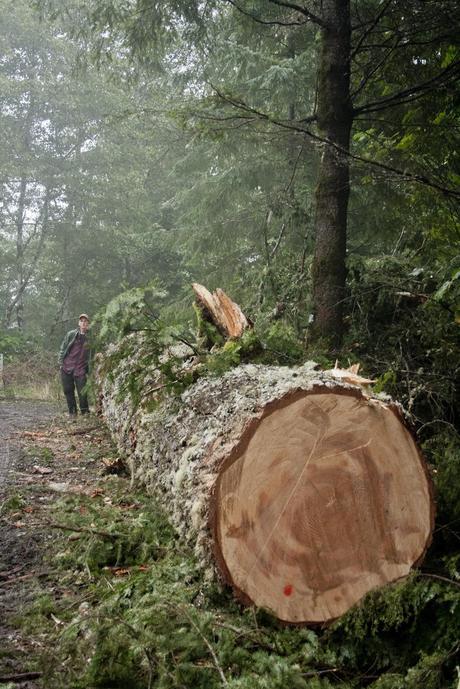by Wiley Cypress / Earth First! Newswire

Photo: Esther Burkett/ Associated Press
In a major victory yesterday for Oregon’s coastal rainforests, three conservation organizations—the Center for Biological Diversity, Cascadia Wildlands, and Portland Audubon—reached a settlement with the State of Oregon to cancel 28 timber sales in the Elliott, Clatsop, and Tillamook forests.
As part of the agreement, the State has also agreed to improve future management practices in all three forests for the marble murrelet, a rare sea bird that nests in old growth trees. “This agreement provides immediate relief for the dwindling population of the marbled murrelet,” said Francis Eatherington of Cascadia Wildlands in a press release yesterday.
This settlement marks the conclusion of a lawsuit filed by the conservation groups in 2012. The lawsuit argued that the State Land Board and the Oregon Department of Forestry were harming the marbled murrelet by deliberately approving timber sales in murrelet nesting habitat, which is protected under the Endangered Species Act.
Things were looking bleak for Oregon’s coastal rainforests, and the Elliott in particular, preceding the lawsuit and injunction filed in 2012. Amidst protest both in the forest and at the State capitol, the State approved a plan to nearly double the annual acreage of clearcut allowed in the Elliott, and pushed forward dozens of timber sales in never-before-logged tracts of forest.

Old growth tree logged in the Elliott State Forest in 2011. Photo: Cascadia Forest Defenders
All of the contentious timber sales approved for sale in 2012 and a handful of sales that were already auctioned 2010-2011 are now canceled. The Oregon Department of Forestry did sell one native, never-before-logged Elliott timber sale in 2013 to Roseburg Forest Products, who clearcut most of the sale this winter. Though victorious, the lawsuit settlement will not protect ancient forest in the Elliott that isn’t considered “suitable habitat” for the marbled murrelet.
“When we blockaded three timber sales in the summer of 2011 we posted a list of demands, and those demands remain the same,” says Ben Jones of Cascadia Forest Defenders, a Eugene-based direct action group. “We will continue to fight for the protection of all ancient, never-before-logged forests and an end to clearcut logging.”
The State is losing money on Elliott State Forest management. “The state of Oregon and ODF flouted the law for years and now are paying the price,” said Noah Greenwald of the Center for Biological Diversity. “It’s time for the State to find a path forward that generates income for schools, but doesn’t drive species extinct in the process.”
Now the State is bound by a 150-year-old constitutional mandate that requires the Land Board to turn a profit on the Elliott and other Common School Fund lands to benefit Oregon’s public school system. Even though, in 2012, Governor Kitzhaber called CSF payouts “a drop in the bucket” for Oregon schools, the Land Board is now considering privatization as the only alternative to clearcutting 850 acres of ancient forest every year.
In December the State Land Board approved 2,728 acres of the Elliott for privatization through an open, competitive auction, handing over management of thousands of acres of previously untouched forest to the highest bidder. The first auction closes in late March.

The first Elliott blockade in 2009. For the memories.
In yesterday’s press release, the three conservation groups involved in the lawsuit recommended alternatives to the current management plan, such as selling the Elliott to “land trusts or other conservation interests” or “protection of the forests for use in carbon markets.”
“As an organization that works directly with rural communities and the climate justice movement, Cascadia Forest Defenders can’t really get behind land privatization or carbon trading—a false solution to climate change,” says Jones. “The Common School Fund system is unjust and broken, and it’s not really our job to fix it. Maybe it’s the system that needs to get cut.”

